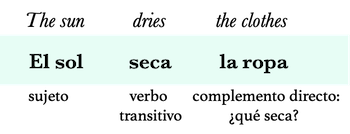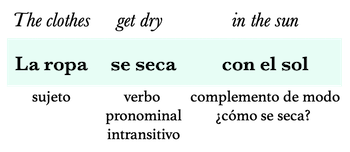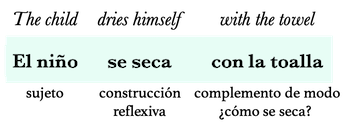48. Verbos pronominales
- Page ID
- 45713
\( \newcommand{\vecs}[1]{\overset { \scriptstyle \rightharpoonup} {\mathbf{#1}} } \)
\( \newcommand{\vecd}[1]{\overset{-\!-\!\rightharpoonup}{\vphantom{a}\smash {#1}}} \)
\( \newcommand{\dsum}{\displaystyle\sum\limits} \)
\( \newcommand{\dint}{\displaystyle\int\limits} \)
\( \newcommand{\dlim}{\displaystyle\lim\limits} \)
\( \newcommand{\id}{\mathrm{id}}\) \( \newcommand{\Span}{\mathrm{span}}\)
( \newcommand{\kernel}{\mathrm{null}\,}\) \( \newcommand{\range}{\mathrm{range}\,}\)
\( \newcommand{\RealPart}{\mathrm{Re}}\) \( \newcommand{\ImaginaryPart}{\mathrm{Im}}\)
\( \newcommand{\Argument}{\mathrm{Arg}}\) \( \newcommand{\norm}[1]{\| #1 \|}\)
\( \newcommand{\inner}[2]{\langle #1, #2 \rangle}\)
\( \newcommand{\Span}{\mathrm{span}}\)
\( \newcommand{\id}{\mathrm{id}}\)
\( \newcommand{\Span}{\mathrm{span}}\)
\( \newcommand{\kernel}{\mathrm{null}\,}\)
\( \newcommand{\range}{\mathrm{range}\,}\)
\( \newcommand{\RealPart}{\mathrm{Re}}\)
\( \newcommand{\ImaginaryPart}{\mathrm{Im}}\)
\( \newcommand{\Argument}{\mathrm{Arg}}\)
\( \newcommand{\norm}[1]{\| #1 \|}\)
\( \newcommand{\inner}[2]{\langle #1, #2 \rangle}\)
\( \newcommand{\Span}{\mathrm{span}}\) \( \newcommand{\AA}{\unicode[.8,0]{x212B}}\)
\( \newcommand{\vectorA}[1]{\vec{#1}} % arrow\)
\( \newcommand{\vectorAt}[1]{\vec{\text{#1}}} % arrow\)
\( \newcommand{\vectorB}[1]{\overset { \scriptstyle \rightharpoonup} {\mathbf{#1}} } \)
\( \newcommand{\vectorC}[1]{\textbf{#1}} \)
\( \newcommand{\vectorD}[1]{\overrightarrow{#1}} \)
\( \newcommand{\vectorDt}[1]{\overrightarrow{\text{#1}}} \)
\( \newcommand{\vectE}[1]{\overset{-\!-\!\rightharpoonup}{\vphantom{a}\smash{\mathbf {#1}}}} \)
\( \newcommand{\vecs}[1]{\overset { \scriptstyle \rightharpoonup} {\mathbf{#1}} } \)
\(\newcommand{\longvect}{\overrightarrow}\)
\( \newcommand{\vecd}[1]{\overset{-\!-\!\rightharpoonup}{\vphantom{a}\smash {#1}}} \)
\(\newcommand{\avec}{\mathbf a}\) \(\newcommand{\bvec}{\mathbf b}\) \(\newcommand{\cvec}{\mathbf c}\) \(\newcommand{\dvec}{\mathbf d}\) \(\newcommand{\dtil}{\widetilde{\mathbf d}}\) \(\newcommand{\evec}{\mathbf e}\) \(\newcommand{\fvec}{\mathbf f}\) \(\newcommand{\nvec}{\mathbf n}\) \(\newcommand{\pvec}{\mathbf p}\) \(\newcommand{\qvec}{\mathbf q}\) \(\newcommand{\svec}{\mathbf s}\) \(\newcommand{\tvec}{\mathbf t}\) \(\newcommand{\uvec}{\mathbf u}\) \(\newcommand{\vvec}{\mathbf v}\) \(\newcommand{\wvec}{\mathbf w}\) \(\newcommand{\xvec}{\mathbf x}\) \(\newcommand{\yvec}{\mathbf y}\) \(\newcommand{\zvec}{\mathbf z}\) \(\newcommand{\rvec}{\mathbf r}\) \(\newcommand{\mvec}{\mathbf m}\) \(\newcommand{\zerovec}{\mathbf 0}\) \(\newcommand{\onevec}{\mathbf 1}\) \(\newcommand{\real}{\mathbb R}\) \(\newcommand{\twovec}[2]{\left[\begin{array}{r}#1 \\ #2 \end{array}\right]}\) \(\newcommand{\ctwovec}[2]{\left[\begin{array}{c}#1 \\ #2 \end{array}\right]}\) \(\newcommand{\threevec}[3]{\left[\begin{array}{r}#1 \\ #2 \\ #3 \end{array}\right]}\) \(\newcommand{\cthreevec}[3]{\left[\begin{array}{c}#1 \\ #2 \\ #3 \end{array}\right]}\) \(\newcommand{\fourvec}[4]{\left[\begin{array}{r}#1 \\ #2 \\ #3 \\ #4 \end{array}\right]}\) \(\newcommand{\cfourvec}[4]{\left[\begin{array}{c}#1 \\ #2 \\ #3 \\ #4 \end{array}\right]}\) \(\newcommand{\fivevec}[5]{\left[\begin{array}{r}#1 \\ #2 \\ #3 \\ #4 \\ #5 \\ \end{array}\right]}\) \(\newcommand{\cfivevec}[5]{\left[\begin{array}{c}#1 \\ #2 \\ #3 \\ #4 \\ #5 \\ \end{array}\right]}\) \(\newcommand{\mattwo}[4]{\left[\begin{array}{rr}#1 \amp #2 \\ #3 \amp #4 \\ \end{array}\right]}\) \(\newcommand{\laspan}[1]{\text{Span}\{#1\}}\) \(\newcommand{\bcal}{\cal B}\) \(\newcommand{\ccal}{\cal C}\) \(\newcommand{\scal}{\cal S}\) \(\newcommand{\wcal}{\cal W}\) \(\newcommand{\ecal}{\cal E}\) \(\newcommand{\coords}[2]{\left\{#1\right\}_{#2}}\) \(\newcommand{\gray}[1]{\color{gray}{#1}}\) \(\newcommand{\lgray}[1]{\color{lightgray}{#1}}\) \(\newcommand{\rank}{\operatorname{rank}}\) \(\newcommand{\row}{\text{Row}}\) \(\newcommand{\col}{\text{Col}}\) \(\renewcommand{\row}{\text{Row}}\) \(\newcommand{\nul}{\text{Nul}}\) \(\newcommand{\var}{\text{Var}}\) \(\newcommand{\corr}{\text{corr}}\) \(\newcommand{\len}[1]{\left|#1\right|}\) \(\newcommand{\bbar}{\overline{\bvec}}\) \(\newcommand{\bhat}{\widehat{\bvec}}\) \(\newcommand{\bperp}{\bvec^\perp}\) \(\newcommand{\xhat}{\widehat{\xvec}}\) \(\newcommand{\vhat}{\widehat{\vvec}}\) \(\newcommand{\uhat}{\widehat{\uvec}}\) \(\newcommand{\what}{\widehat{\wvec}}\) \(\newcommand{\Sighat}{\widehat{\Sigma}}\) \(\newcommand{\lt}{<}\) \(\newcommand{\gt}{>}\) \(\newcommand{\amp}{&}\) \(\definecolor{fillinmathshade}{gray}{0.9}\)| Los verbos pronominales, numerosos en español, son los que se conjugan con pronombres reflexivos. Generalmente tienen significados específicos cuando son pronominales y no siempre indican una acción del sujeto sobre sí mismo o sobre su cuerpo, como los estudiados en la sección 47 (levantarse, vestirse, arreglarse, etc.). Por ejemplo: | Pronominal verbs are those conjugated with reflexive pronouns. Their number is considerable in Spanish. They usually have specific meanings as pronominal verbs, not always referring to an action that the subject performs on itself or its body, as studied in section 47 (levantarse, vestirse, arreglarse, etc.). Consider, for example, the verb secar(se) (to dry): |
Tipos
|
A. Algunos verbos son casi siempre pronominales: |
A. Some verbs are almost always pronominal: |
|
arrepentirse (de) (-ie-) |
to repent, to regret, to change one's mind |
| Forma transitiva (con objeto directo): acordar (algo), comunicar (algo), conformar (algo), despedir (algo o a alguien), equivocar (algo), enamorar (a alguien), olvidar (algo o a alguien), reunir (algo), sentir (algo [sustantivo]) |
Forma pronominal (sin objeto directo): acordarse (de), comunicarse (con), conformarse (con), despedir (de), equivocarse (de), enamorarse (de), olvidarse (de), reunirse (con), sentirse (de una manera) |
||
| We agreed on keeping the secret. She communicated the news to me. They formed a good team. The boss fired the secretary. The cab driver confused the way. My talent seduced the audience. I already forgot that incident. Did you gather the money? I felt pride for you. |
Acordamos guardar el secreto. Ella me comunicó la noticia. Conformaron un buen equipo . El jefe despidió al secretario. El taxista equivocó el camino. Mi talento enamoró al público. Ya olvidé ese incidente. ¿Reuniste el dinero? Sentí orgullo por ti. |
No nos acordamos de la fecha. No se comunicó con nadie. Se conformó con tu explicación. No se despidió de nadie. El taxista se equivocó de camino. Él se enamoró de otra persona. Me olvidé de los detalles. ¿Te reuniste con amigos? Me sentí orgullosa de ti. |
We don't remember the date. She communicated with no one. He settled for your explanation. He said goobye to no one. The driver took the wrong way. He fell in love with someone else. I forgot (about) the details. Did you get together with friends? I felt proud of you. |
| Forma no pronominal: acción sin énfasis particular |
Forma pronominal: acción enfática, con carácter total o definitivo |
||
| I learned a lot in this class. They drank too much wine. The dog ate early today. She decided to leave early. Did you go to the bank? S/he took the children to the park. |
Aprendí mucho en esta clase. Bebieron demasiado vino. El perro comió temprano hoy. Ella decidió salir temprano. ¿Fuiste al banco? Llevó a los niños al parque. |
Me aprendí toda la canción. Se bebieron la botella (completa). El perro se comió mi cena. Se decidió a cambiar de empleo. ¿Por qué te fuiste tan temprano? Se llevó a los niños. |
I learned the whole song by heart. They drank up the (whole) bottle. The dog ate up my dinner. She made up her mind about. Why did you leave so early? S/he took the children away. |
¡A practicar!
Escriba en el paréntesis el número de la oración que corresponde a cada tipo de pronominal. [Ejercicio interactivo] (Diccionario).
| 1. Aún queda vino; los invitados no se lo tomaron todo. 2. Me comunico mejor por escrito que en persona. 3. Está muy enojado y no nos atrevemos a hablarle en este momento. 4. ¿Sí te despediste de los abuelos antes de viajar? 5. No me arrepiento de lo que hice: era lo que tenía que hacer. 6. Juana se fue sin decir nada. |
( ) siempre es pronominal ( ) siempre es pronominal ( ) es pronominal cuando no es transitivo ( ) es pronominal cuando no es transitivo ( ) el pronominal indica una acción definitiva ( ) el pronominal indica una acción definitiva |
- Traducción al inglés
- 1) There's still some wine left; the guests did not drink it up. 2) I communicate better in writing than in person. 3) He's very upset and we don't dare talking to him right now. 4) Did you say goodbye to your grandparents before traveling? 5) I do not regret what I did: it was what I had to do. 6) Juana left without saying a word.
- Respuestas
- siempre pronominales: 3 - 5 • no transitivos: 2 - 4 • acción definitiva: 1 - 6
Cambios de estado
|
Un cuarto grupo de verbos pronominales, el más numeroso, son los que indican un cambio de estado, que puede ser mental o físico, general o específico, súbito o gradual. A. Para cambios generales, se emplean comúnmente los siguientes: |
A fourth group of pronominal verbs, the largest one, consists of those used to indicate a change of state, often conveyed in English with the verbs to become or to get. B. The following are common ways to express the idea of becoming: |
|
convertirse en (-ie-) + sustantivo |
to become, convert into + noun |
|
Cambios de estado mental o emocional |
Cambios de estado físico |
Cambios de lugar, posición o estatus |
|||
|
aburrirse (de) |
to get bored |
averiarse |
to break down |
acercarse (a) |
to get close(r) |
| Ejemplos: | |
| No me acostumbré a esa rutina. Nos estamos aburriendo mucho. ¿Cómo te diste cuenta de eso? El tren se averió y tuvimos que bajarnos. No debes preocuparte por nada. Nunca me duermo temprano. Nos desviamos porque la vía estaba cerrada. Necesitas moverte más para bajar de peso. El último vagón se separó del tren en marcha. |
I did not get used to that routine. We're getting pretty bored. How did you realize that? The train broke down and we had to get off. You shouldn't worry about a thing. I never go to sleep early. We took a detour because the road was closed. You need to move more in order to lose weight. The last wagon got separated from the moving train. |
| Construcción valorativa (con pronombre de objeto indirecto): | Forma pronominal (con pronombre reflexivo): | ||
| The news made them glad. Empty talk tires me. Your attitude didn't irritate me. Did my answer bother you? Sales worry the boss. Seeing you surprises us. |
Les alegró la noticia. La palabrería me cansa. A mí no me irritó tu actitud. ¿Te molestó mi respuesta? Al jefe le preocupan las ventas. Nos sorprende verte. |
Se alegraron con la noticia. Me canso de la palabrería. Yo no me irrité por tu actitud. ¿Te molestaste por mi respuesta? Él se preocupa por las ventas. Nos sorprendimos de verte. |
They got glad with the news. I get tired with empty talk. I didn't get irritated at your attitude. Did you get upset with my answer? He worries about sales. We got surprised to see you. |
¡A practicar!
Escoja el verbo que mejor completa cada oración. [Ejercicio interactivo] (Diccionario).
1. Cuando me dieron la noticia de mi nuevo empleo, me hice / puse muy contento.
2. La gente se hizo / volvió loca cuando el equipo nacional ganó el campeonato mundial.
3. Soy tímido y me pongo / vuelvo rojo fácilmente.
4. ¿Por qué te pones / vuelves nerviosa con los exámenes?
5. Para muchas personas, Bolívar se convirtió en / puso un símbolo de la libertad.
6. Dice que se va a hacer / poner profesora para ayudar a su pueblo.
7. Con la tormenta, el mar se puso / transformó en un monstruo temible.
- Traducción al inglés
- 1) When they gave me the news about my new job, I got quite happy. 2) People went mad when the national team won the world championship. 3) I'm shy and I turn red easily. 4) Why do you get nervous with exams? 5) To many people, Bolívar became a symbol of liberty. 6) She says she's going to become a teacher in order to help her people. 7) With the storm, the sea became a frightening monster.
- Respuestas
- 1: puse - 2: volvió - 3: pongo - 4: pones - 5: convirtió en - 6: hacer - 7: transformó en
Complete con el pronombre se o con ø, si el verbo no debe ser pronominal. [Ejercicio interactivo] (Diccionario).
1. Alba y Abel ___ divorciaron hace un año porque no podían comunicar___ bien.
2. Abel ___ sentía cansado con frecuencia porque no ___ podía dormir bien.
3. Alba nunca ___ quejaba, pero sí ___ preocupaba por la situación.
4. Por todo eso, ____ discutían mucho y la relación ___ deterioró bastante.
5. Ambos ____ esforzaron por resolver los problemas, pero no pudieron ;mejorar___ las cosas.
6. Abel ___ enamoró a una vecina y Alba ___ enamoró de un compañero de trabajo.
7. Alba ___ fue de la casa y ___ llevó a los niños. Abel ___ quedó en la misma casa hasta hoy.
8. Pero, después de unos años, ____ dieron cuenta de que ____ querían estar juntos otra vez.
9. Entonces ___ sorprendieron a todos sus amigos cuando ____ casaron por segunda vez.
- Traducción al inglés
- 1) Alba and Abel got divorced a year ago because they couldn't communicate well. 2) Abel felt tired frequently because he couldn't sleep well. 3) Alba never complained, but she used to get worried about the situation. 4) Because of all that, the used to argue a lot and the relationship deteriorated quite a bit. 5) They both made an effort to solve the problems, but they couldn't improve things. 6) Abel seduced a neighbor and Alba fell in love with a workmate. 7) Alba left the house and took the children with her. Abel stayed in the same house until today. 8) But, after a few years, they realized they wanted to be together again. 9) So they surprised all of their friends when they got married for the second time.
- Respuestas
- 1: se - se • 2: se - ø • 3: se - se • 4: ø - se • 5: se - ø • 6: ø - se • 7: se - se - se • 8: se - ø • 9: ø - se
Práctica interactiva
• aprenderespañol: verbos pronominales
• Nelson: https://personal.colby.edu/~bknelson/SLC/reflexives.html
• Todoele.net: verbos pronominales - verbos recíprocos - verbos reflexivos
• UTexas Austin (laits), videos y explicaciones: pronominales de cambio de estado (avanzado)
• Yepes: https://www.bowdoin.edu/~eyepes/newgr/refl.htm
Más información
• Construcciones reflexivas, §47
• Listado de verbos pronominales y notas sobre su uso, apéndice 5






